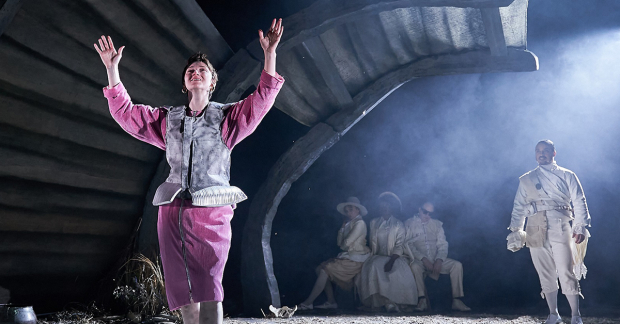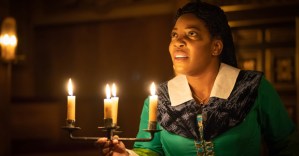Review: Faustus: That Damned Woman (Lyric Hammersmith Theatre and tour)
Headlong and the Lyric Hammersmith Theatre have co-produced Chris Bush’s reimagining of the Faustus tale

© Manuel Harlan
What happens when you take a slab of Virginia Woolf's Orlando, a dash of the Great Plague, a pinch of Black Mirror and a sprinkling of The Good Place? The result of such arcane alchemy is Chris Bush's off-the-wall yet earnestly enjoyable retelling of Doctor Faustus, which, in a co-production between Lyric Hammersmith and Headlong, opens a nationwide tour in west London.
Putting the witch in gender-switched, Bush's freshly penned two-hour piece reimagines Johann as Johanna, who in the heart of the 17th century, sells her soul to the Devil to secure the divine safety of her deceased mother ("The devil is no worse than a man", Faustus bristles). The cost: she has 144 years left to live (in whatever period she wishes), after which she is the property of Lucifer. The newly empowered Faustus travels forwards through time, alighting as she pleases: trying to help the lot of humankind, particularly women, throughout the centuries.
Bush revels in the opportunities that this new spin affords, and it's exciting to note that, as a woman, Faustus uses her unholy powers in a drastically different manner to her counterpart in the original: gnawing at the boundaries of science and understanding with each passing period rather than wasting her time on fame and dalliances. The plot becomes an unashamed sci-fi romp – the stage littered with the ashes of human history as Faustus sears her way through the centuries.
At the centre of the time-travelling tumult is a steady central performance from Jodie McNee, stern, savage yet constantly bursting with passion and rarely off-stage. The way she physically recreates the seven deadly sins is a fantastic sequence overseen by director Caroline Byrne.
All housed within a giant, decaying conch on Ana Inès Jabares-Pita's murky set, McNee is helped by a solid supporting turn from Danny Lee Wynter's malicious Mephistopheles – the Devil's lackey, Faustus' confidante and wise-cracker supreme, Wynter is a fickle and fey swan, hovering over Johanna's shoulder as time ticks down to damnation.
It can be very hit and miss – as the centuries slip away so too does Bush's dramatic footing – the gendered nuance of the first act traded for a more generic good versus evil twist by the time Faustus has been to the year 3000. There's also a tantalisingly unexplored hint at more complex motivation for Mephistopheles' affections, which floats idly by without a real conclusion.
By no means soul-sapping, Bush has concocted a novel and thoughtful new riff on a musty classic. Though unsteady on its feet in places, sci-fi purists will see a glimmering story shine through Byrne's gloomy production.



















